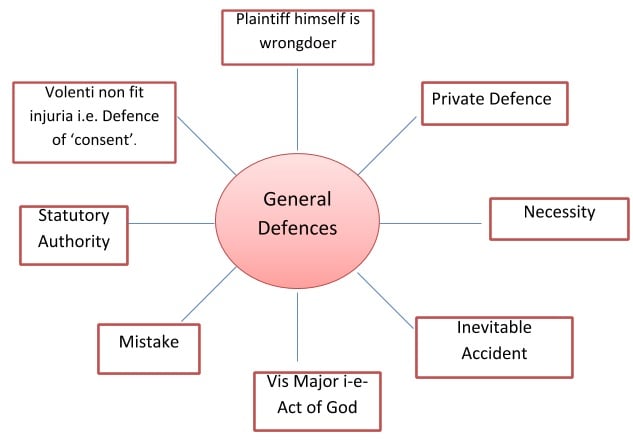GENERAL DEFENCES IN LAW OF TORTS
TORT is a French word which means ‘wrong’. The derivation of the word can also be traced to the Latin term ‘tortum’ (to twist). Thus, ‘tort’ implies conduct that is twisted or wrongful.
3/3/20243 min read


In torts, when the plaintiff brings action against a defendant, for a particular tort, he has to prove existence of essential ingredients of that tort. But in some cases even if the essential ingredients are proved, the defendant can still justify his tort on the basis of principles which negate tortious liability.
Following are the General defenses:
1. VOLENTI NON FIT INJURIA
The maxim volenti non fit injuria means voluntarily suffered injury is not fit for action. It simply means that in cases where the plaintiff himself consents to suffer the harm, he is not allowed to complaint for that and his mere consent serves as a good defense against him.
The two essentials conditions for applicable of the maxim are:
a. Consent to suffer harm should be voluntarily given by the plaintiff
b. The plaintiff had the knowledge of risk.
It is to be remembered that, it is necessary that the plaintiff had proper knowledge about the harm and danger of the act that would be inflicted on him, if he lacked knowledge regarding the same, it will be presumed that he did not consent for it. Knowledge does not necessarily imply assent. In order to apply the maxim it is necessary that the plaintiff was aware of the risk involved and he with knowledge agreed to suffer the harm.
2.INEVITABLE ACCIDENT
Accident means an unexpected injury and if same could not have been foreseen and avoided inspite of reasonable care on the part of the defendant, it is inevitable accident.
It is important to note in cases of inevitable accidents is that the defense is available only when the event was unforeseen and consequences were unavoidable even though reasonable care was taken.
Therefore, if in the performance of a lawful act sufficient care was taken and inspite of that damages occurs, then such damage affords no cause of action.
3.MISTAKE
Mistake means when an error is committed in understanding or when one understands or perceives wrongly. Generally, mistake of fact or mistake of law has no defense to an action for tort.
When a person does and act which willfully interferes the rights of another person, there is no defense for such an act. But it is an exceptional case wherein the defendant had acted reasonably.
4.PRIVATE DEFENCE
Right of private defense is available to every citizen of the nation. It is a right of person to protect himself and his property against the unlawful aggression of others. The Indian Penal Code, in section 96 to 106 also lays down statutory of Right to Private Defense.
Right to private defense can be exercised only when there is immediate threat and not remote or a reasonable apprehension os such threat.
5,NECESSITY
An act that is done under necessity so that a greater harm can be prevented is not made actionable even if there was harm which was caused intentionally. This defense is based on the maxim ‘salus populi supreme lex’ which means the welfare of the people is the supreme law.
Necessity as an exception is different from private defense and inevitable accidents
6.PLAINTIFF, THE WRONGDOER
Principle of equity states that anyone who comes for justice should come with clean hands. Thus, in cases wherein, due to the fault of the plaintiff, harm is inflicted upon him or plaintiff was equally responsible in the wrongful act, then in such a case, the plaintiff cannot involve his right of tortious liability.
However it is a doubtful situation if the defendant can take such a defense under the law of torts and escape liability by pleading that at the time of the defendant’s wrongful act the plaintiff was also engaged in doing some wrongful act.
7.STATUTORY AUTHORITY
When as per a statue, an authority or some other person does a particular act, which would otherwise be a tort, the party injured has no remedy except the one provided by the statue itself.
The immunity under statutory authority is for the harm that was obvious and also for the harm which is incidental to the exercise of such authority.
8.ACT OF GOD (VIS MAJOR)
According to Pollock act of God is an “operation of natural forces so unexpected that no human foresight or skill could reasonably be expected to anticipate it”.
It involves such acts which were out of control of the humans and no about of prevention or care would have saved the damages causes. Acts such as floods, earthquakes, droughts etc. are considered as act of God or vis major.
Thus, to plead the defense of act of God two conditions must be established:
a. The act must arise due to working of natural forces.
b. The occurrences must be extraordinary and not one which could be anticipated and reasonably guarded against.
